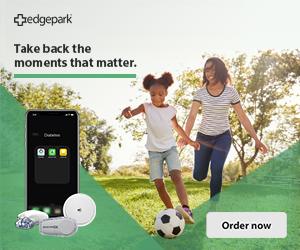Interview with a Certified Diabetes Educator: Insight and advice for living with T1D
Type 1 diabetes (T1D) can be a complicated condition to manage, so it helps to have a supportive team behind you. A Certified Diabetes Educator can devote the time to work with you one-on-one, which can increase your confidence in daily management as well as the long-term aspects of diabetes and health.
Participating in diabetes education can help address any uncertainties you may have. For example, understanding how to properly manage your nutrition, count carbohydrates, track blood sugar and manage insulin can put worries about managing T1D to rest.
Meeting with a Certified Diabetes Educator is a benefit of most health plans. Medicare, Medicaid and most private insurance companies cover diabetes self-management education (DSME) by qualified providers. Be sure to ask your doctor for more information.
5 expert tips for living your best life with diabetes
Edgepark Certified Diabetes Educator Debra Brown, RD, LD, frequently answers questions from individuals navigating their diabetes journey. Having worked in the healthcare industry for 17 years, she has provided answers around everything from diabetes devices and weight management to tips for healthy cooking. In inspiring others to pair diabetes nutrition with daily lifestyles, she has advice on everything from how much caffeine to drink to what kind of bolus dose is needed for beer.
Brown — who holds a Bachelor of Science degree in dietetics — sat down to answer five of the most common questions she encounters in her work. Here are her responses:
1. There are days when I'm tired and thirsty, and others when I feel great. How can I figure out what is causing the fluctuations in my blood sugar that result in me feeling this way?
"Look at what you ate that day. Did you drink enough water? It's recommended that you consume water equal to half your body weight in ounces. How much caffeine have you had? Caffeine can cause dehydration. Up to 400 milligrams of caffeine a day is considered safe. A brewed 8-ounce coffee has about 95 milligrams of caffeine compared to a brewed black tea, which has about 47 milligrams.
Are you eating out often and choosing highly processed foods? Processed foods may have high levels of sodium and result in thirst. Daily sodium is recommended at fewer than 2,300 milligrams per day — equal to one teaspoon of salt. Salt adds up quickly.
Keeping a log of what you eat, drink and your blood glucose levels can help you identify patterns that result in blood sugar highs and lows. Knowledge is power."
2. Should I consider using an insulin pump or a continuous glucose monitor?
"An insulin pump and a continuous glucose monitor (CGM) are different devices that can help you manage T1D and identify fluctuations in blood sugar from foods, fluids, exercise and other activities.
An insulin pump is a small device with the ability to deliver insulin continuously (basal) or quickly (bolus) for carbohydrate intake. You can correct a high glucose level by typing into the insulin pump your blood glucose level or grams of carbs consumed. Many users find increased flexibility in the timing of meals and exercise when wearing an insulin pump. Studies have shown that an insulin pump can improve diabetes control and lessen the risk of hypoglycemia.
A continuous glucose monitor checks blood sugars frequently throughout the day. With a CGM you can see what your blood glucose has been and what it is at the moment, as well as any trends. Trends in blood sugar allow you to prevent highs and lows.
Both devices are helpful — they can be used separately or together. Insurance usually covers an insulin pump and a CGM. Discuss with your doctor if using these monitoring devices might make managing insulin easier for you."
3. Is there a difference between wine, beer and alcohol in the amount of insulin I need to give myself?
"Alcohol has an effect on blood sugars levels — it prevents the liver from producing glucose. The level of sugar in alcohol may result in low blood sugar several hours after having a drink.
Sugar content in alcohol varies widely. Track the quantity of alcohol you drink, the alcohol content, the sugar and the carbohydrate content. Pace yourself. Eat something with slow-acting carbs before you drink alcohol.
Dose insulin according to the amount of carbohydrate in the drink. Check blood sugars more frequently, and beware of highs or lows while consuming alcohol.
4. It's difficult taking time off work every three months to attend a doctor appointment, is it OK to schedule a telehealth appointment every once in a while?
"Yes, scheduling a telehealth appointment now and then can ease the burden on your busy schedule when possible. People with T1D are discovering the benefits of online doctor appointments."
5. The daily time it takes to manage my diabetes often gets me down. Some days I feel hopeless that I'll be able to eat right, exercise and feel good all the time. Are there any shortcuts to managing all that I have to do to succeed?
"No one is perfect when it comes to managing diabetes. Set three to four attainable goals. Translate the goals into healthy habits. For example, eat out less and pack a lunch for work. Measure out servings of carbs for each week. These small changes will lift your mood and empower you to meet your goals.
Break exercise into manageable blocks. Combine activity into your daily routine. Schedule a 10-minute walk after each meal to meet the goal of 30 minutes of daily exercise.
Manage stress by taking a few minutes each day to breathe, and visualize the stress melting away. Engage in mindfulness-based activities to reduce anxiety, depression and build confidence. Refuse to let the challenges of T1D diminish the joy of everyday life!"
It's common to have questions about diabetes self-care. Edgepark customers can send questions to Debra Brown, a Certified Diabetes Educator, through the Edgepark website or by calling 1-866-400-5183.




